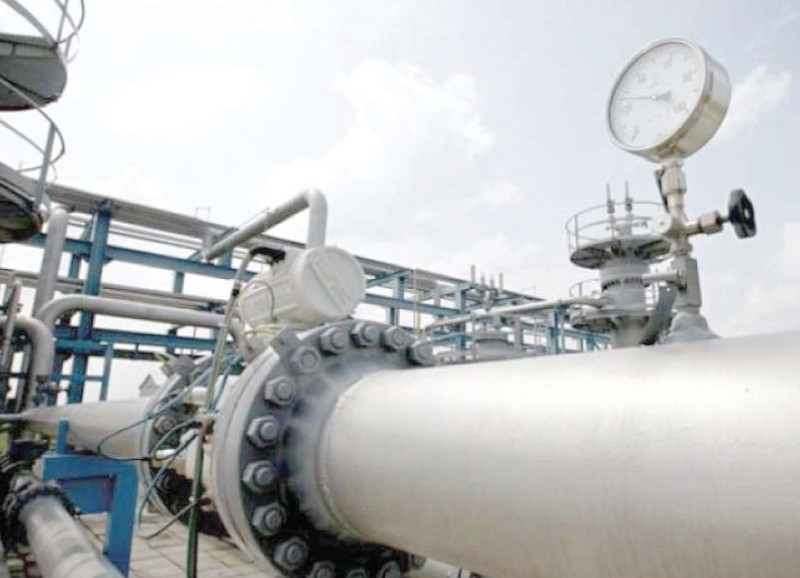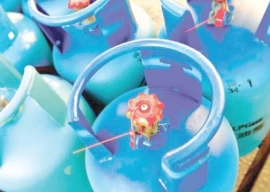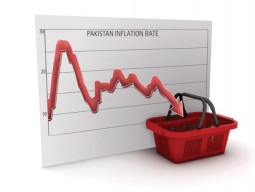
Sindh has vehemently opposed the approval of a framework for the sale of 35% local gas to private parties — a decision that, if implemented, would put an additional Rs243 billion burden on residential consumers over the next five years due to the use of imported gas as an alternative.
The Sindh government did not endorse the summary, which sought the "approval" of the Executive Committee of the National Economic Council (ECNEC) for the gas sale framework to private parties. The Petroleum Division brought the summary — framework for third-party sale of natural gas under an amended petroleum policy — for ECNEC approval without formally placing it on the meeting agenda. Deputy Prime Minister Ishaq Dar chaired the ECNEC meeting earlier this week.
The Council of Common Interest (CCI) — the constitutional body responsible for handling matters related to Pakistan's federation — had in January allowed gas exploration and production companies to sell up to 35% of their production to third parties. However, the decision was contingent on first meeting the overall demand and securing ECNEC's endorsement of the framework.
Sindh consistently opposed the approval during the meeting, arguing against discussing the matter without distributing the summary beforehand, according to government sources. The Khyber-Pakhtunkhwa (K-P) representative was unable to attend the meeting physically due to a lockdown, and connectivity issues hindered remote participation.
The CCI had directed the Petroleum Division to prepare a framework and present it to ECNEC for consideration. However, Sindh representatives firmly stated that ECNEC could not approve the summary as the provincial government had already sought a review of the January 2024 CCI decision taken by the caretaker government.
Sindh argued that the CCI's condition to meet the "overall demand" before allowing private sector gas sales had not been followed in letter and spirit, as the government neglected the demand of residential consumers.
The ECNEC discussed the summary without input from the provinces, the Ministry of Finance, the Ministry of Planning, the Ministry of Law, Oil & Gas Regulatory Authority (OGRA), or the Federal Board of Revenue (FBR).
Pakistan is a gas-deficient country that relies on imports to meet its needs. Prioritising private parties over government entities in gas allocation raises questions. It is unclear whether the Cabinet Division will document the ECNEC deliberations as "approved" or "deferred" due to Sindh's objections and the lack of input from K-P.
The CCI decision stipulated that gas sales should be competitive and that the province hosting the well-head would have priority under Article 158 of the Constitution. Sources said Sindh officials objected to the summary, asserting there was no consensus on the matter. The meeting chairman attempted to reassure Sindh that ECNEC was merely endorsing the framework, but Sindh sought additional time for consultation. A handout issued after the ECNEC meeting did not mention the gas sale framework discussion. Sindh Irrigation Minister Jam Shoro, an ECNEC member, did not respond to requests for comment.
Within the government, there was also disagreement over implementing the CCI decision. To resolve this, the prime minister formed a committee under Dar. However, the inclusion of two private company representativesbeneficiaries of the CCI decisionin the Dar-led committee raised concerns of a conflict of interest, as the decision benefits private parties over residential consumers.
The Sui Northern Gas Pipelines Limited (SNGPL), a key stakeholder, argued that allowing private parties to buy 35% of gas directly from producers would impose an additional Rs243 billion cost on consumers between 2025 and 2030. The SNGPL documents warned that the decision would reduce indigenous supplies, shift high-paying Re-Gasified Liquefied Natural Gas (RLNG) consumers to third parties, and increase RLNG diversion costs and gas losses.
Petroleum Division Secretary Momin Agha declined to comment on the matter.
According to the government's framework, the decision to allow companies to sell 35% of gas to private parties applies to discoveries made under the amended Petroleum Policy of February 2024. It also applies to existing licenses for gas discoveries not yet allocated and issued after the notification of the CCI decision. The framework allows third parties to use the Sui gas network, lay their own pipelines, or employ virtual pipelines for transportation. Prices charged from third parties must not be less than OGRA-notified wellhead gas prices for respective zones.
The CCI had approved increasing the right of well-head companies to sell gas to private parties from 10% to 35%, reducing the SNGPL and Sui Southern Gas Company (SSGC) quotas to two-thirds. However, the SNGPL said that allocating 100MMCFD to private parties in the first year violated the CCI decision, which did not specify any volume.
The SNGPL warned that implementing the decision would reduce the system gas component in the blend offered to industries, making domestic industries uncompetitive and tariffs unaffordable for the public. It added that subsidised sectors like domestic consumers and fertilisers would be left with limited gas, while private parties would target high-paying sectors like industry, CNG, and power.
The SNGPL proposed allowing gas utilities to purchase and sell gas at competitive prices without regulatory constraints. It also suggested adding subsidy costs to third-party transportation tariffs, similar to wheeling charges in the power sector.


















COMMENTS
Comments are moderated and generally will be posted if they are on-topic and not abusive.
For more information, please see our Comments FAQ